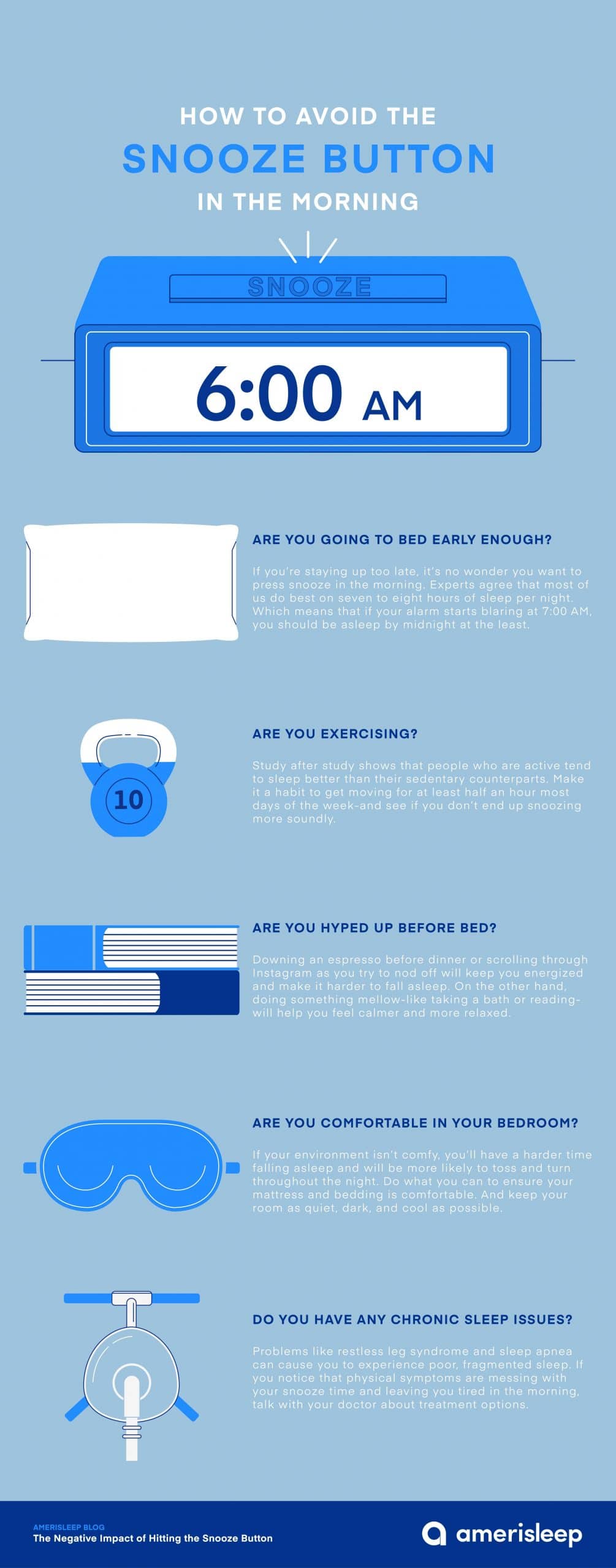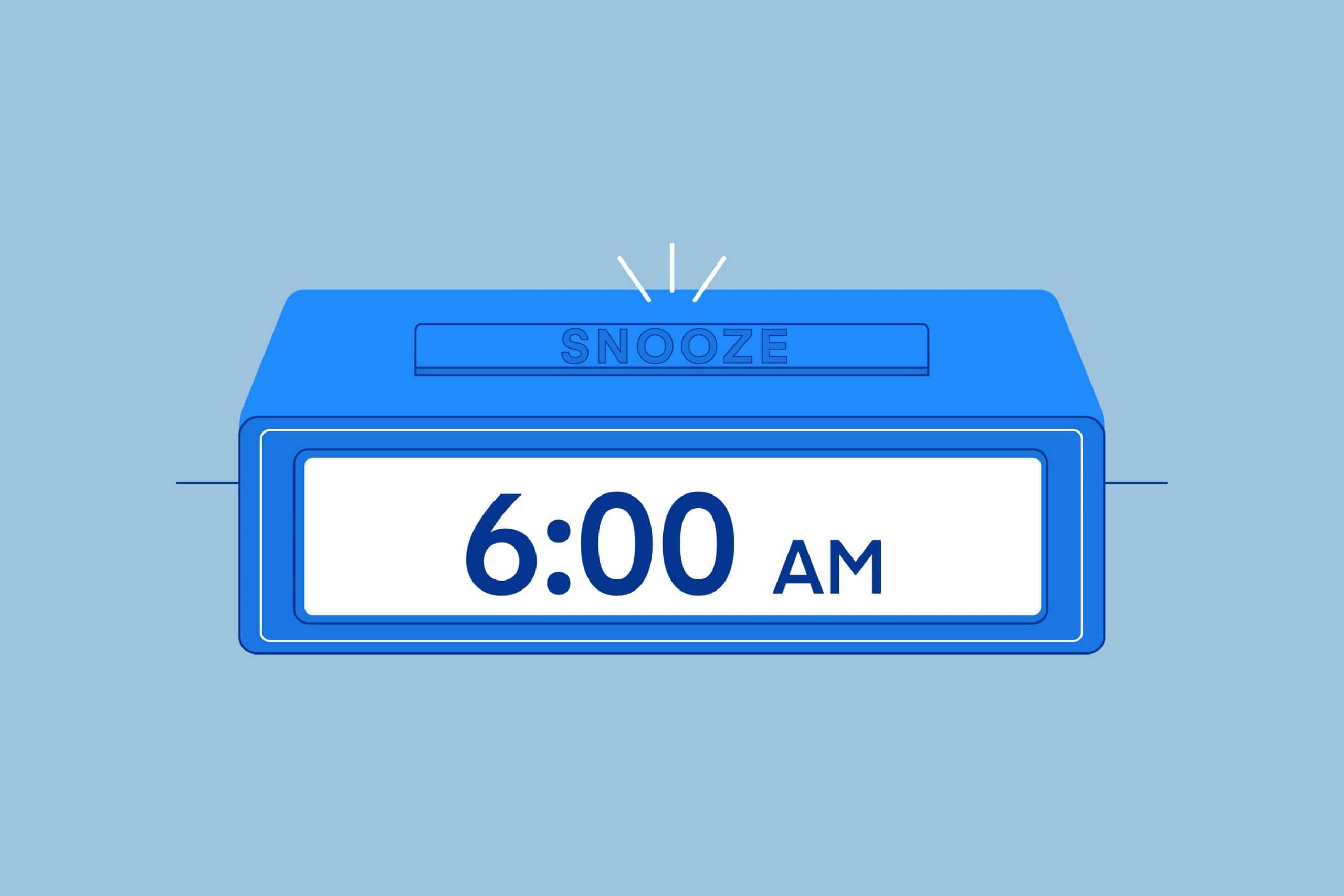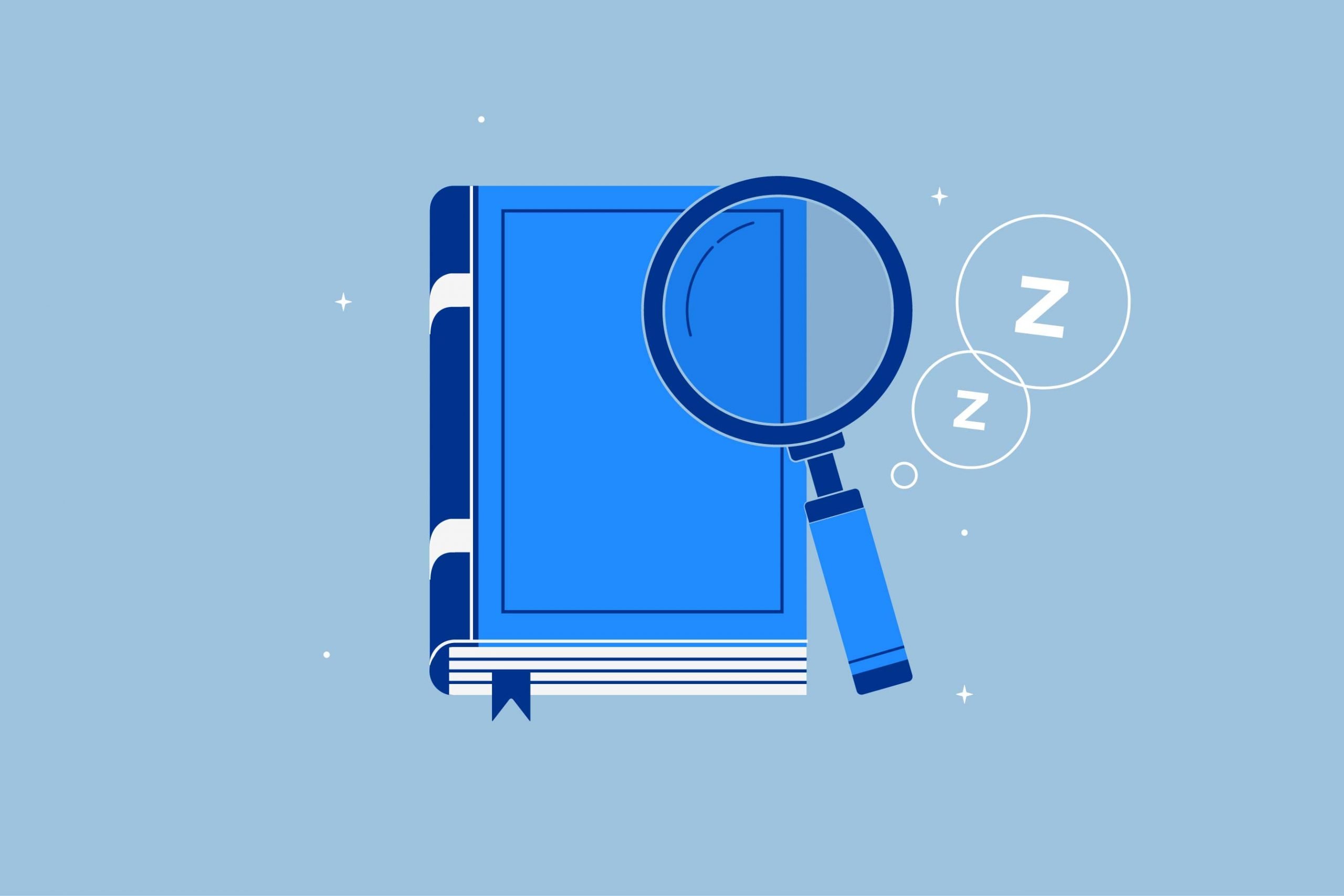Key Takeaways
- Why You Shouldn’t Hit Snooze So Much: Hitting the snooze button regularly can make you feel more tired and disrupt your body’s internal clock, leading to sleep problems and potential health issues.
- What to Do Instead of Snoozing: To avoid hitting snooze, establish a regular bedtime, get enough exercise, avoid caffeine and screen time before bed, and create a comfortable sleep environment. If you have chronic sleep issues, consult a doctor for help.
- Just Get Out of Bed: Instead of giving into temptation and hitting snooze, resist the temptation and get out of bed when your alarm goes off to avoid the groggy feeling associated with sleep inertia.
It’s 7:30 AM and your alarm is blaring. You know you should probably get up and get started with your day, but you’re still tired and your bed is crazy comfortable.
It’s totally normal to want to hit the snooze button. And plenty of us do it: According to one survey, more than one in three adults press snooze three times before getting up in the morning. And more than half of adults in their twenties and early thirties say that they hit the snooze button every morning.
And while its not a huge deal to snag a few extra minutes of shut eye once in a while, fighting your alarm on a regular basis might actually leave you feeling more tired during the day and sleep worse at night.
Skeptical? Allow us to change your mind. Here’s why hitting the snooze button will leave you feeling lousy—and how to stop relying on it to feel well rested.
How Snoozing Messes With Your Sleep Cycle
In order to understand why hitting the snooze button can be so detrimental, it helps to have a grasp on your sleep cycle, or the stages of sleep your brain cycles through in order to help you rest up and recharge.
Ideally, when your head hits the pillow, you feel drowsy and begin to nod off. Now, you’re in light sleep, when your heart rate slows down and your body temperature drops.
After light sleep comes deep sleep. This stage is super important, since it’s the period of sleep when your body is hard at work regrowing tissue, building bone and muscle, and strengthening your immune system.
Once you’ve moved through deep sleep, you hit REM sleep. During REM (which stands for rapid eye movement), your brain is highly active and you may experience intense dreams.
“You may experience dreams in NREM sleep too,” explains Professor Peirson. “One factor that makes studying dreams very difficult is that the the recall of them varies enormously. We may just recall REM dreams better!”
But despite that intense activity, REM sleep is actually highly restorative—and getting enough of it is crucial for feeling sharp and focused the next day. You usually experience your first REM stage about 90 minutes after you first nod off, and cycle through several times throughout the night.
“There have been suggestions that we reduce the relative strength of synaptic connections during NREM sleep as we can’t keep strengthening synapses indefinitely (the synaptic homeostasis hypothesis),” says Professor Peirson. “This suggests that we test these brain circuits during REM sleep (replay).”
So what does all this have to do with the snooze button? When your alarm goes off in the morning, you’re usually nearing the end of your last REM cycle (If you have a standard bedtime, sleep duration and sleep cycle duration, that is. Those who keep odd-hour schedules like shift workers may feel different, and find themselves prone to shift work sleep disorder).
Ideally, you want to wake from REM sleep rather than NREM to avoid sleep inertia. Verified Source National Library of Medicine (NIH) World’s largest medical library, making biomedical data and information more accessible. View source
Why Regular Bedtimes and Wake Times Matter
As Professor Peirson explains it, “Sleep is regulated by 2 processes – the circadian clock and sleep homeostasis. The clock helps induce/maintain sleep at specific times and wake at other times. Sleep homeostasis means that the longer we are awake, the more we need to sleep (this is often referred to as sleep pressure).”
“On a morning, having just slept, our sleep pressure is low. This builds throughout the day, and our circadian clock increases our drive for waking to counteract this sleep pressure. When this waking drive falls on an evening and sleep pressure is highest, we have an ideal window of opportunity to sleep.”
“The delicate balance between circadian and homeostatic processes is why a regular bedtime is ideal.”
“It also explains why if we go to bed too early, we cannot sleep (our circadian system is keeping us awake still). It has been proposed that this was important for our ancestors to find a safe place to sleep at the end of the day when we are most tired.”
“It also explains why we feel so tired on an afternoon if we haven’t slept well: then our sleep pressure is high and our circadian drive for waking is only just rising and cannot counter the high sleep pressure.”
The Long Term Consequences of Hitting Snooze
There’s more. If you went to bed at a decent hour the night before, your body’s internal clock is ready to wake up once the alarm goes off. But when you hit snooze and go back to sleep, you send your whole system into a confusing tailspin. Before long, your body isn’t sure when it’s time to wake up and when it’s time to go to sleep.
“Our sleep is regulated by two key processes – our circadian clock and a homeostatic sleep pressure” says Prof Stuart Peirson from the University of Oxford. “Sleep pressure means that the longer we are awake, the more we need to sleep. Our circadian clock helps keep us awake during the day, even as sleep pressure normally builds up.”
“On a night, as our circadian drive for waking falls and our sleep pressure is high, it creates an ideal window for sleep.” he says. “If we have an irregular sleep and wake time, this makes hitting this optimal sleep window more difficult. Moreover, we sleep badly and wake up tired, meaning our circadian clock cannot keep us awake sufficiently the next day.”
And if your body doesn’t know when it’s time to go to sleep, you could be spending a lot of time tossing and turning. As a result, you end up getting less of the quality sleep you need.
“Keeping a regular bedtime and waking time is beneficial – as long as you are getting enough sleep,” explains Professor Peirson. “A common problem is that we often don’t get enough sleep and by using an alarm clock are waking up when we still need to sleep.”
And it doesn’t take long to feel the effects of poor sleep. Just one week of poor sleep can mess with hundreds of genes in your body—leading to heightened stress, lowered immunity, and increased inflammation.
“When your circadian clock is properly aligned and you are getting enough sleep, you will find that you wake up reliably around the same time each day, with the alarm clock simply as a backup,” says Professor Peirson. “Starting the day without the noise of an alarm is far more civilized.”
After a while, those effects start to add up. When you’re stressed, you have a harder time focusing and are more prone to feeling snappy or irritable.
Plus, when your immune system isn’t working at capacity, you’re more likely to get sick—which could make it even harder to achieve quality sleep. Worst of all? Experiencing chronically high levels of inflammation could increase your risk for serious health problems like heart disease, cancer, stroke, and cognitive decline.
Figuring Out Why You’re Hitting the Snooze Button
We’ve established that hitting the snooze button will probably make you feel foggy and more tired. And regularly relying on it to sneak in more Zzz’s will mess with your body’s internal clock, which can actually deprive you of sleep and set you up for some major health problems.
In other words, you should try to hit snooze as infrequently as possible. But to reduce your reliance on the magic button, you need to figure out what’s making you want to sleep in in the first place. To get to the answer, consider these questions:
- Are you going to bed early enough? If you’re staying up too late, it’s no wonder you want to press snooze in the morning. Experts agree that most of us do best on seven to eight hours of sleep per night, though individual needs do vary. Which means that if your alarm starts blaring at 7:00 AM, you should be asleep by midnight at the latest.
- Are you exercising? Study after study shows that people who are active tend to sleep better than their sedentary counterparts. Make it a habit to get moving for at least half an hour most days of the week—and see if you don’t end up snoozing more soundly.
- Are you hyped up before bed? Downing an espresso before dinner or scrolling through Instagram as you try to nod off will keep you energized and make it harder to fall asleep. On the other hand, doing something mellow—like taking a bath or reading—will help you feel calmer and more relaxed.
- Are you comfortable in your bedroom? If your environment isn’t comfy, you’ll have a harder time falling asleep and will be more likely to toss and turn throughout the night. Do what you can to ensure you’re on the best mattress for you. And keep your room as quiet, dark, and cool as possible. (Be sure to keep it quiet, too, since sounds can have a major impact on your sleep cycle.)
- Do you have any chronic sleep issues? Problems like restless leg syndrome and obstructive sleep apnea can cause you to experience poor, fragmented sleep. If you notice that physical symptoms are messing with your snooze time and leaving you tired in the morning, talk with your doctor about treatment options.
“Key factors to determine if you are getting enough sleep are how do you sleep on free days?” says Professor Peirson. “If you need to sleep in, you are not getting enough sleep. And if you feel tired and want to sleep during the day you are not getting enough sleep. If these things don’t happen, you may just be a lucky person who doesn’t need as much sleep!”
What To Do Instead of Hitting Snooze
The answer is pretty simple, but you might not like it: Just get out of bed. Yes, waking up as soon as your alarm goes off will probably feel unpleasant at first, thanks to sleep inertia.
“There is some fascinating data showing that the brain actually doesn’t sleep as a single organ, Verified Source National Library of Medicine (NIH) World’s largest medical library, making biomedical data and information more accessible. View source and different parts of the brain can be asleep and awake at the same time,” says Professor Peirson. “This is called ‘local sleep’ and may be related to sleep inertia. Literally, some parts of your brain can still be asleep when you wake up and take time to wake up.”
But after a few minutes, that groggy feeling will wear off—and you’ll start your day feeling refreshed and ready for action. (Which, if you’re used to dragging yourself out of bed every morning, might seem hard to imagine.)
“This also relates to ‘social jetlag,'” explains Professor Peirson. “This is a term coined by Till Roenneberg in Munich, who highlighted that social and work constraints mean that our circadian clock is effectively jet lagged during the working week, as we adopt an activity/rest pattern that differs from our internal clock.”
“We then try to catch up at the weekend. This means that we can suffer from a condition similar to jet-lag of a few hours during the working week, which is not ideal for performance!”
And if you don’t totally trust yourself to say no to the lure of the snooze button? Go with the age-old trick of putting your alarm on the other side of your bedroom, far away from your bed. But don’t feel too bummed. At the end of the day, you can dive right back into dreamland.
Have you stopped hitting the snooze button? Did you notice an impact in how you felt during the day—and how you slept at night?

About the author
Marygrace Taylor is an award-winning health writer for Amerisleep. Her commitment to sleep health is evident in her ability to consistently prioritize eight hours of sleep each night. Her in-depth interviews with industry experts, such as Ken Ceder on "Why Light is Essential for Great Sleep and Optimum Health," highlight her dedication to delivering valuable insights. Marygrace's work has been featured in reputable publications like Business Insider, Glamour, Refinery29, Metro UK, and Hunker, further solidifying her expertise in the field.
View all posts





